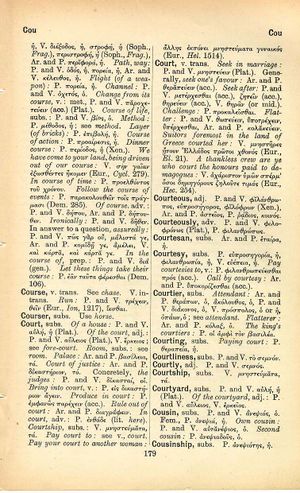court
Εὐφήμει, ὦ ἄνθρωπε· ἁσμενέστατα μέντοι αὐτὸ ἀπέφυγον, ὥσπερ λυττῶντά τινα καὶ ἄγριον δεσπότην ἀποδράς → Hush, man, most gladly have I escaped this thing you talk of, as if I had run away from a raging and savage beast of a master
English > Greek (Woodhouse)
substantive
of a house: P. and V. αὐλή, ἡ (Plato).
of the court, adj.: P. and V. αὔλειος (Plato), V. ἕρκειος; see fore-court.
palace: Ar. and P. βασίλεια, τά.
court of justice: Ar. and P. δικαστήριον, τό.
concretely, the judges: P. and V. δικασταί, οἱ.
bring into court, v.: P. εἰς δικαστήριον ἄγειν.
produce in court: P. ἐμφανῶς παρέχω, ἐμφανῶς παρέχειν (acc.).
rule out of court: Ar. and P. διαγράφειν.
in court, adv.: P. ἐνθάδε (lit. here).
courtship, subs.: V. μνηστεύματα, τά.
pay court to: see v., court.
pay your court to another woman: ἄλλης ἐκπόνει μνηστεύματα γυναικός (Eur., Helen 1514).
verb transitive
seek in marriage: P. and V. μνηστεύειν (Plato).
generally, seek one's favour: Ar. and P. θεραπεύειν (acc.).
seek after: P. and V. μετέρχεσθαι (acc.), ζητεῖν (acc.), θηρεύειν (acc.), V. θηρᾶν (or mid.).
flatter: P. and V. θωπεύειν, ὑποτρέχειν, ὑπέρχεσθαι, Ar. and P. κολακεύειν.
suitors foremost in the land of Greece courted her: V. μνηστῆρες ᾔτουν Ἑλλάδος πρῶτοι χθονός (Eur., Electra 21).
a thankless crew are ye who court the honours paid to demagogues: V. ἀχάριστον ὑμῶν σπέρμ' ὅσοι δημηγόρους ζηλοῦτε τιμάς (Eur., Hecuba 254).

